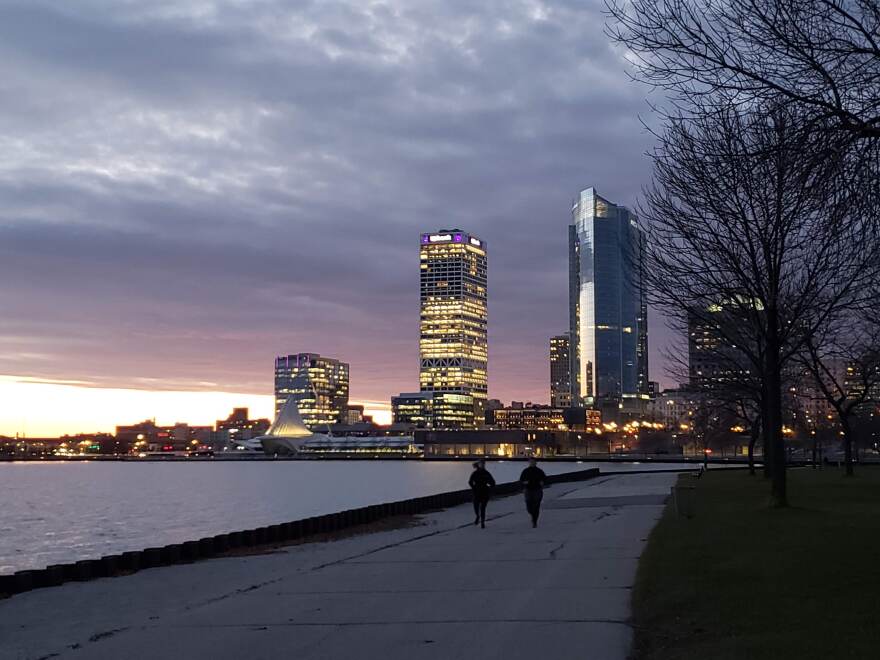Clean water is a building block for public health and the economy.
In late March, as part of his $2.3 trillion dollar infrastructure plan, President Joe Biden proposed spending $111 billion on water infrastructure.
Midwestern cities like Milwaukee are grappling with how to ensure equal access to clean water in low-income communities and communities of color.
Now, some Great Lakes mayors, specifically the Mayors Commission on Water Equity of the Great Lakes and St. Lawrence Cities Initiative, are now calling upon Congress to give them $58 billion to replace lead service lines and lead plumbing and fixtures, as well as lead paint in homes and schools.
Sam Cunningham, the mayor of Waukegan, Illinois, summed up the equity challenges in Great Lakes cities: “These include high costs of water, lead water lines, water workforce development, urban flooding. The health and welfare of our residents are at stake. We need Congress to address these issues immediately.”
Cunningham says communities are buckling under the costs of aging and sub-standard water infrastructure.
He says low-income and communities of color are shouldering a disproportionate share of the burden. These communities tend to be concentrated in areas with lower-quality infrastructure and more severe environmental challenges.
In the city of Milwaukee, at least 70,000 households get city water delivered through lead pipes, which can negatively affect the development of children. So in addition to reducing lead exposure in kids, Milwaukee Mayor Tom Barrett says federal money will help create jobs for economically disadvantaged populations.
The mayors are asking for $10 million dollars to expand the federal water workforce development grant program and make it permanent.
Barrett says, “What this program should do is it should invest in internships and apprenticeship programs. And it should be targeted to areas with high unemployment, large low-income populations, rural areas and large communities of color and underrepresented in the water workforce now. That's a challenge here in Milwaukee. And I'm guessing it's a challenge throughout all the communities that are on this call here today.”
The infrastructure bill is moving through congressional committees.
NPR reports House Speaker Nancy Pelosi expects it to be voted on in the House by early July, then it would have to go through the Senate.
The Mayors Commission on Water Equity asks Congress to invest:
- $1 billion to map all lead service lines. The commission is asking Congress to fully fund the complete mapping of all lead service lines in the United States, on both public and private property, so stakeholders can have full awareness of the scope of the lead problem.
- $58 billion to create a cross-agency “Lead Safe Communities” fund, with $46 million to replace lead pipes and $12 billion to address other sources of lead. The commission says this fund would support states programs to identify and replace lead plumbing, fixtures, and paint in homes and schools, and add funding for interim corrosion control treatment measures.
- $8 billion to create a permanent Low-Income Household Drinking Water and Wastewater Emergency Assistance Program. The commission says Congress should create a new permanent assistance program to meet the full need of low-income customers and the utilities that serve them.
- $100 million in technical assistance to support utilities with equitable rate design. The commission wants to ensure all can access water services regardless of income and asks Congress to provide technical assistance grants to help utilities design more equitable rate structures within the confines of relevant state laws.
- $10 million to expand the Water Workforce Development grants program. The commission wants investment in targeted internship, apprenticeship, pre-apprenticeship and post-secondary bridge programs targeted to nonprofits, educational institutions and utilities that have high retirement rates and are located in areas with high unemployment, large low-income populations, rural areas, and large communities of color underrepresented in the water workforce.
- Focus the $56 billion modernization plan on climate resilient water infrastructure. The Biden administration’s American Jobs Plan calls for $56 billion in grants and low-cost flexible loans to modernize aging drinking water, stormwater, and wastewater systems. The commission requests that funding be explicitly focused on building climate resilience.





